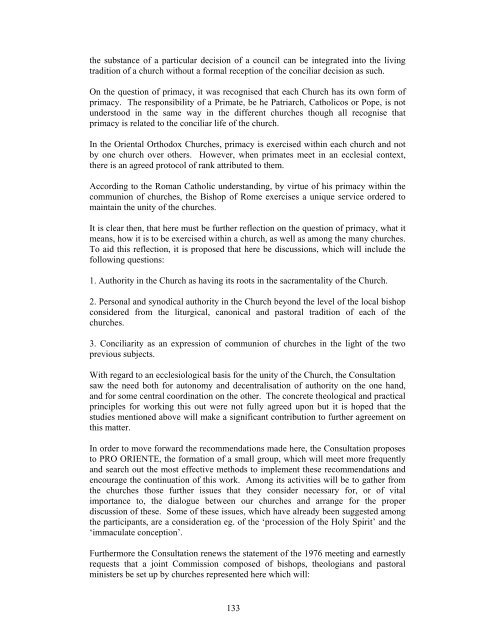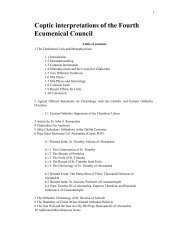Coptic Church & Ecumenical Movement - Saint Mina Coptic ...
Coptic Church & Ecumenical Movement - Saint Mina Coptic ...
Coptic Church & Ecumenical Movement - Saint Mina Coptic ...
Create successful ePaper yourself
Turn your PDF publications into a flip-book with our unique Google optimized e-Paper software.
the substance of a particular decision of a council can be integrated into the living<br />
tradition of a church without a formal reception of the conciliar decision as such.<br />
On the question of primacy, it was recognised that each <strong>Church</strong> has its own form of<br />
primacy. The responsibility of a Primate, be he Patriarch, Catholicos or Pope, is not<br />
understood in the same way in the different churches though all recognise that<br />
primacy is related to the conciliar life of the church.<br />
In the Oriental Orthodox <strong>Church</strong>es, primacy is exercised within each church and not<br />
by one church over others. However, when primates meet in an ecclesial context,<br />
there is an agreed protocol of rank attributed to them.<br />
According to the Roman Catholic understanding, by virtue of his primacy within the<br />
communion of churches, the Bishop of Rome exercises a unique service ordered to<br />
maintain the unity of the churches.<br />
It is clear then, that here must be further reflection on the question of primacy, what it<br />
means, how it is to be exercised within a church, as well as among the many churches.<br />
To aid this reflection, it is proposed that here be discussions, which will include the<br />
following questions:<br />
1. Authority in the <strong>Church</strong> as having its roots in the sacramentality of the <strong>Church</strong>.<br />
2. Personal and synodical authority in the <strong>Church</strong> beyond the level of the local bishop<br />
considered from the liturgical, canonical and pastoral tradition of each of the<br />
churches.<br />
3. Conciliarity as an expression of communion of churches in the light of the two<br />
previous subjects.<br />
With regard to an ecclesiological basis for the unity of the <strong>Church</strong>, the Consultation<br />
saw the need both for autonomy and decentralisation of authority on the one hand,<br />
and for some central coordination on the other. The concrete theological and practical<br />
principles for working this out were not fully agreed upon but it is hoped that the<br />
studies mentioned above will make a significant contribution to further agreement on<br />
this matter.<br />
In order to move forward the recommendations made here, the Consultation proposes<br />
to PRO ORIENTE, the formation of a small group, which will meet more frequently<br />
and search out the most effective methods to implement these recommendations and<br />
encourage the continuation of this work. Among its activities will be to gather from<br />
the churches those further issues that they consider necessary for, or of vital<br />
importance to, the dialogue between our churches and arrange for the proper<br />
discussion of these. Some of these issues, which have already been suggested among<br />
the participants, are a consideration eg. of the ‘procession of the Holy Spirit’ and the<br />
‘immaculate conception’.<br />
Furthermore the Consultation renews the statement of the 1976 meeting and earnestly<br />
requests that a joint Commission composed of bishops, theologians and pastoral<br />
ministers be set up by churches represented here which will:<br />
133








